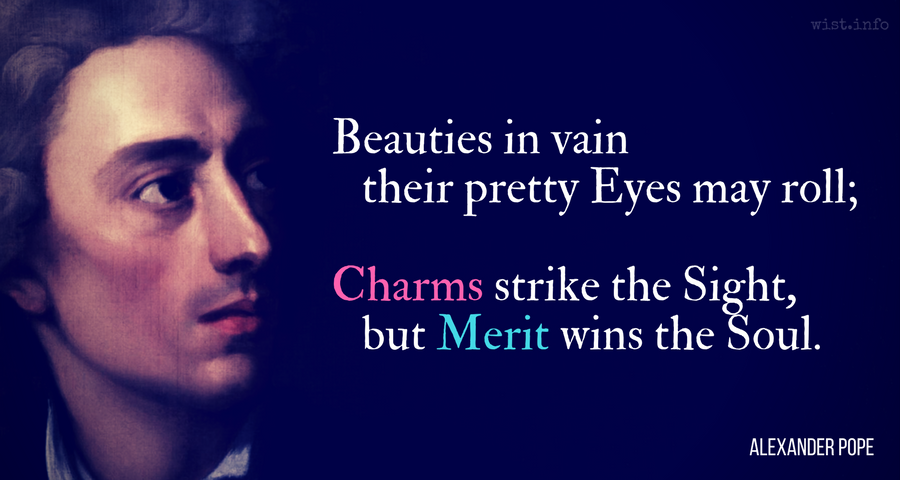All is not gold that glisters.
George Herbert (1593-1633) Welsh priest, orator, poet.
Jacula Prudentum, or Outlandish Proverbs, Sentences, &c. (compiler), # 306 (1640 ed.)
(Source)
Quotations about:
attraction
Note not all quotations have been tagged, so Search may find additional quotes on this topic.
Away with silks, away with lawn,
I’ll have no scenes or curtains drawn;
Give me my mistress as she is,
Dress’d in her nak’d simplicities;
For as my heart e’en so mine eye
Is won with flesh, not drapery.Robert Herrick (1591-1674) English poet
“Clothes Do But Cheat and Cozen Us,” Hesperides, # 402 (1648)
(Source)
The fable of Tantalus has generally been regarded as symbolizing avarice. It’s at least equally applicable to ambition, love of fame, indeed to almost every passion.
[La fable de Tantale n’a presque jamais servi d’emblème qu’à l’avarice. Mais elle est, pour le moins, autant celui de l’ambition, de l’amour de la gloire, de presque toutes les passions.]Nicolas Chamfort (1741-1794) French writer, epigrammist (b. Nicolas-Sébastien Roch)
Products of Perfected Civilization [Produits de la Civilisation Perfectionée], Part 1 “Maxims and Thoughts [Maximes et Pensées],” ch. 1, ¶ 70 (1795) [tr. Parmée (2003), ¶ 58]
(Source)
(Source (French)). Alternate translations:
The fable of Tantalus is hardly ever applied except to the passion of avarice; but it is at least as applicable to ambition, to the love of glory, and to nearly all the other passions.
[tr. Mathers (1926)]
The fable of Tantalus has been used almost exclusively as an emblem of avarice, but it is at least as applicable to ambition, the love of fame, and virtually all the passions.
[tr. Merwin (1969)]
The fable of Tantalus has almost never served as a precept except in the case of avarice. But it is, at all events, a precept attaching no wit less to ambition, to love of glory, to almost all passions.
[tr. Pearson (1973)]
The fable of Tantalus has nearly only ever served as an emblem of avarice. However, it is at least as much a symbol of ambition, of the love of glory, and of nearly every passion.
[tr. Siniscalchi (1994)]
If it is usual to be strongly impressed with things rare and extraordinary, how comes it then that Virtue is taken so little notice of?
[S’il est ordinaire d’être vivement touché des choses rares, pourquoi le sommes-nous si peu de la vertu?]
Jean de La Bruyère (1645-1696) French essayist, moralist
The Characters [Les Caractères], ch. 2 “Of Personal Merit [Du Mérite Personnel],” § 20 (2.20) (1688) [Browne ed. (1752)]
(Source)
(Source (French)). Alternate translations:
If 'tis common to be Toucht with things Rare, how comes it that we are so little toucht with Virtue?
[Bullord ed. (1696)]
If 'tis common to be touch'd with things rare, how comes it we are so little touch'd with Virtue?
[Curll ed. (1713)]
If it be usual to be strongly impressed by things that are scarce, why are we so little impressed by virtue?
[tr. Van Laun (1885)]
If it is usual to be strongly attracted by things that are rare, why has virtue so little attraction for us?
[tr. Stewart (1970)]
If I had lived in that wild early world
When each day saw new monstrosities,
I would have fawned upon a giantess, curled
Voluptuous as a cat around her knees.[Du temps que la Nature en sa verve puissante
Concevait chaque jour des enfants monstrueux,
J’eusse aimé vivre auprès d’une jeune géante,
Comme aux pieds d’une reine un chat voluptueux.]Charles Baudelaire (1821-1867) French poet, essayist, art critic
Les Fleurs du Mal [The Flowers of Evil], # 19 “La Géante [The Giantess],” st. 1 (1857) [tr. Lerner (1999)]
(Source)
Also in in the 1861 ed. (# 19) and 1868 (# 20). (Source (French)). Alternate translations:
When Nature in her lavish lustiness
Bred day by day new, strange monstrosities,
Would I had lived with a young giantess
Like a warm cat who at a queen's feet lies.
[tr. Squire (1909)]
I should have loved -- erewhile when Heaven conceived
Each day, some child abnormal and obscene,
Beside a maiden giantess to have lived,
Like a luxurious cat at the feet of a queen
[tr. Scott (1909)]
From the time when Nature in her furious fancy
Conceived each day monstrosities obscene,
I had loved to live near a young Giantess of Necromancy,
Like a voluptuous cat before the knees of a Queen.
[tr. Symons (1913)]
In times of old when Nature in her glad excess
Brought forth such living marvels as no more are seen,
I should have loved to dwell with a young giantess,
Like a voluptuous cat about the feet of a queen.
[tr. Dillon (1936)]
When Nature once in lustful hot undress
Conceived gargantuan offspring, then would I
Have loved to live near a young giantess,
Like a voluptuous cat at a queen's feet.
[tr. Shapiro (1942)]
Of old when Nature, in her verve defiant,
Conceived each day some birth of monstrous mien,
I would have lived near some young female giant
Like a voluptuous cat beside a queen,
[tr. Campbell (1952)]
At the time when Nature with a lusty spirit
Was conceiving monstrous children each day,
I should have liked to live near a young giantess,
Like a voluptuous cat at the feet of a queen.
[tr. Aggeler (1954)]
In times when Nature, lusty to excess,
Bred monstrous children, would that I had been
Living beside a youthful giantess,
Like a voluptuous cat beside a queen
[tr. LeClercq (1958)]
In those times when Nature in powerful zest
Conceived each day monstrous children,
I would have loved to live near a young giantess,
A voluptuous cat at the feet of a queen.
[tr. Wagner (1974)]
Had I been there when primal Nature teemed
with monstrous progeny, I would have tried
to live beside some mammoth girl, the way
a cat will sprawl at the feet of a queen
[tr. Howard (1982)]
In olden days when Nature in her lusty exuberance daily conceived monstrous offspring, I would gladly have lived beside some youthful giantess, like a voluptuous cat at the feet of a queen.
[tr. Scarfe (1986)]
In times when madcap Nature in her verve
conceived each day a hatch of monstrous spawn,
I might have lived near some young giantess,
Like a voluptuous cat before a queen.
[tr. McGowan (1993)]
In the days when Nature, in her playful power,
conceived every day some new, monstrous children,
I should have liked to live with a young giantess,
like a voluptuous cat at the feet of a queen.
[tr. Clark (1995)]
Back when Nature in her zestful sway daily brought forth child monsters, I would like to have lived with a young giantess, like a voluptuous cat at the queen's feet.
[tr. Waldrop (2006)]
In those days when Nature's overwhelming Lust
Engendered infant-monsters day by day
I'd love to have lived with a young giantess.
Like a lazy cat at the foot of my queen I'd lay.
[tr. Underhill]
History proves there is no better advertisement for a book than to condemn it for obscenity. Forbidden fruits have unique flavors, and the bounds of suppression create new limits of desire.
Holbrook Jackson (1874-1948) English journalist, editor, author
The Fear of Books, Part 2, ch. 1 (1932)
(Source)
Once divested of missionary virus, the cult of our gods gives no offense. It would be a peaceful age if this were recognized, and religion, Christian, communist or any other, were to rely on practice and not on conversion for her growth.
Freya Stark (1893-1993) Franco-British explorer, travel writer [Freya Madeline Stark]
Ionia: A Quest, ch. 17 (1954)
(Source)
It is the people with secret attractions to various temptations who busy themselves most with removing those temptations from other people; really they are defending themselves under the pretext of defending others, because at heart they fear their own weakness.
Ernest Jones (1879-1958) Welsh neurologist and psychoanalyst
“Criticisms of Psycho-Analytic Treatment,” Speech, Chicago Neurological and Chicago Medical Societies (18 Jan 1911)
Originally published in the American Journal of the Medical Sciences (Jul 1911). Reprinted in Papers on Psycho-Analysis, ch. 12 (1918).
Frodo drew the Ring out of his pocket again and looked at it. It now appeared plain and smooth, without mark or device that he could see. The gold looked very fair and pure, and Frodo thought how rich and beautiful was its colour, how perfect was its roundness. It was an admirable thing and altogether precious.
J.R.R. Tolkien (1892-1973) English writer, fabulist, philologist, academic [John Ronald Reuel Tolkien]
The Lord of the Rings, Vol. 1: The Fellowship of the Ring, Book 1, ch. 2 “The Shadow of the Past” (1954)
(Source)
When you offered your wife to each passer-by free,
Not a soul ever wanted to try her.
You have learnt wisdom now: kept beneath lock and key
She has crowds of men waiting to buy her.[Nullus in urbe fuit tota qui tangere vellet
Uxorem gratis, Caeciliane, tuam,
Dum licuit: sed nunc positis custodibus ingens
Turba fututorum est: ingeniosus homo es.]Martial (AD c.39-c.103) Spanish Roman poet, satirist, epigrammatist [Marcus Valerius Martialis]
Epigrams [Epigrammata], Book 1, epigram 73 (1.73) (AD 85-86) [tr. Pott & Wright (1921)]
(Source)
(Source (Latin)). Alternate translations:
Cayus, none reckned of they wife a poynt,
While each man might, without all let or cumber,
But since a watch o're her thou didst appoint,
Of Customers she hath no little number.
Well, let them laugh hereat that list, and scoffe it,
But thou do'st find what makes most for thy profit.
[tr. Harington (1618)]
Scarce one in all the city would embrace
Thy proffere'd wife, Caecilian, free to have;
But now she's guarded, and lock'd up, apace
Thy custom comes. Oh, thou'rt a witty knave!
[tr. Fletcher (c. 1650)]
Your wife's the plainest piece a man can see:
No soul would touch her, whilst you left her free:
But since to guard her you employ all arts,
The rakes besiege her. -- You're a man of parts!
[tr. Hay (1755), ep. 74]
These was no one in the whole city, Caecilianus, who desired to meddle with your wife, even gratis, while permission was given; but now, since you have set a watch upon her, the crowd of gallants is innumerable. You are a clever fellow!
[tr. Bohn's Classical (1859)]
There was no one in the whole town willing to touch your wife, Caecilianus, gratis, while he was allowed; but now you have set your guards, there is a huge crowd of gallants. You are an ingenious person!
[tr. Ker (1919)]
No one in town would touch your wife
so long as she was free, and willing to boot.
But you posted guards, and suddenly brought to life
a swarm of suitors ardent after forbidden fruit
in the garden.
Say, you're a wily warden.
[tr. Bovie (1970)]
When you complaisantly allowed Any man, free of charge, to lay Hands on your wife, not one would play. But now you've posted a house guard There's an enormous randy crowd. Caecilianus, you're a card.
[tr. Michie (1972)]
Nobody in all Rome would have wanted to lay a finger on your wife gratis so long as it was permitted, Maecilianus; but now you have posted guards, there is a huge crowd of fuckers. You're a smart fellow.
[tr. Shackleton Bailey (1993)]
To screw your wife, unguarded, no one cared.
But once you barred her door, a thousand dared.
[tr. Wills (2007)]
None in all Rome would've wished to touch your wife
for free -- if you permitted it -- not ever.
Now that you've posted guards, Caecilianus,
you've drawn a crowd of fuckers. You're so clever.
[tr. McLean (2014)]
No one in this city would
touch your wife, while free they could;
now she’s guarded, there’s a band
of fuckers for her -- clever man!
[tr. @sentantiq/Robinson (2016)]
Caecilianus,
There wasn’t a guy in this whole damn city
Who would have touched your old lady without a stud fee
When she was easily available.
But now, with all those chaperones you’ve hired,
There’s a pack of cocksmen waiting to bang her.
You sure are clever.
[tr. Salemi]
Why, it is the prohibition that makes anything precious. There is a charm about the forbidden that makes it unspeakably desirable.
Mark Twain (1835-1910) American writer [pseud. of Samuel Clemens]
Note (1896-02), Mark Twain’s Notebook, ch. 24 “Ceylon and India” (1935) [ed. Albert Bigelow Paine]
(Source)
Speaking of Adam and the original Forbidden Fruit. Written while in Bombay, India.
Your breasts are like gazelles,
twin deer feeding among lilies.The Bible (The Old Testament) (14th - 2nd C BC) Judeo-Christian sacred scripture [Tanakh, Hebrew Bible], incl. the Apocrypha (Deuterocanonicals)
Song of Solomon (Song of Songs) 4:5 [GNT (1976)]
(Source)
Repeated in 7:3 (in some translations 7:4).
Alternate translations:
Thy two breasts are like two young roes that are twins, which feed among the lilies.
[KJV (1611)]
Your two breasts are two fawns,
twins of a gazelle,
that feed among the lilies.
[JB (1966); NJB (1985)]
Your two breasts are like two fawns,
twins of a gazelle doe,
that graze among the lilies.
[CEB (2011)]
Your two breasts are like two fawns,
twins of a gazelle,
that feed among the lilies.
[NRSV (2021 ed.)]
Your breasts are like two fawns,
Twins of a gazelle,
Browsing among the lilies.
[RJPS (2023 ed.)]
People who care for you inevitably become beautiful.
Beauty without grace, is a hook without a bait.
Anne "Ninon" de l'Enclos (1620-1705) French author, courtesan, patron of the arts [Ninon de Lenclos, Ninon de Lanclos]
The Memoirs of Ninon de L’Enclos, Vol. 1, “Life and Character” (1761)
(Source)
Ralph Waldo Emerson used almost precisely the same phrase in "Beauty," The Conduct of Life (1860).
The allurement that women hold out to men is precisely the allurement that Cape Hatteras holds out to sailors: they are enormously dangerous and hence enormously fascinating.
H. L. Mencken (1880-1956) American writer and journalist [Henry Lewis Mencken]
“The Incomparable Buzz-Saw,” The Smart Set (May 1919)
(Source)
We cannot do without it, and yet we disgrace and vilify the same. It may be compared to a cage, the birds without despair to get in, and those within despair to get out.
[Il en advient ce qui se veiod aux cages: les oyseaux qui en sont dehors, desperent d’y entrer: et d’un pareil soing en sortir, ceuix qui sont au dedans.]
Michel de Montaigne (1533-1592) French essayist
“Upon Some Verses of Virgil,” Essays (1580-88)
On marriage. For more discussion of others who have used this metaphor, see here.
Alt. trans.: "We cannot live without it, and yet we do nothing but decry it. It happens, as with cages, the birds without despair to get in, and those within despair of getting out." [tr. Cotton (1877)]
Alt. trans.: "Though we cannot live without it, yet we do nothing but decry it. We see the same with birdcages: the birds outside despair to get in, and those within despair to get out. [Autobiography, ch. 6 "This Discreet Business of Marriage," tr. Lowenthal (1935)]
Beauties in vain their pretty Eyes may roll;
Charms strike the Sight, but Merit wins the Soul.
If God didn’t want women to be looked at, he would have made ’em ugly — that’s reasonable, isn’t it? God isn’t a cheat; He set up the game Himself — He wouldn’t rig it so that the marks can’t win, like a flat joint wheel in a town with the fix on. He wouldn’t send anybody to Hell for losing in a crooked game.
Robert A. Heinlein (1907-1988) American writer
Stranger in a Strange Land, ch. 27 [Patty] (1961)
(Source)
It must be added, lest we be reproached for leaving out details important to our readers’ understanding of subsequent events, that the lady seemed to have all the attributes of beauty, grace and charm that make a young man’s heart beat faster and cause his eyes to widen, lest they miss the least nuance of expression or gesture. It need hardly be added that Khaavren was just of the type to appreciate all of these qualities; that is to say, he was young and a man, and had, moreover, a vivid imagination which allowed his thoughts to penetrate, if not the mind of the lady opposite him, at least the folds and angles of her gown.
Find joy with the wife you married in your youth, fair as a hind, graceful as a fawn. Let hers be the company you keep, hers the breasts that ever fill you with delight, hers the love that ever holds you captive.
The Bible (The Old Testament) (14th - 2nd C BC) Judeo-Christian sacred scripture [Tanakh, Hebrew Bible], incl. the Apocrypha (Deuterocanonicals)
Proverbs 5:18-19 [JB (1966)]
(Source)
Alternate translations:
Rejoice with the wife of thy youth. Let her be as the loving hind and pleasant roe; let her breasts satisfy thee at all times; and be thou ravished always with her love.
[KJV (1611)]
So be happy with your wife and find your joy with the woman you married -- pretty and graceful as a deer. Let her charms keep you happy; let her surround you with her love.
[GNT (1976)]
Find joy with the wife you married in your youth, fair as a hind, graceful as a fawn: hers the breasts that ever fill you with delight, hers the love that ever holds you captive.
[NJB (1985)]
Rejoice in the wife of your youth.
She is a lovely deer, a graceful doe.
Let her breasts intoxicate you all the time;
always be drunk on her love.
[CEB (2011)]
Rejoice in the wife of your youth,
a lovely deer, a graceful doe.
May her breasts satisfy you at all times;
may you be intoxicated always by her love.
[NRSV (2021 ed.)]
Find joy in the wife of your youth --
A loving doe, a graceful mountain goat.
Let her breasts satisfy you at all times;
Be infatuated with love of her always.
[RJPS (2023 ed.)]
HARKEN: [In an interrogation room] You fought with Captain Reynolds in the war?
ZOE: Fought with a lot of people in the war.
HARKEN: And your husband?
ZOE: Fight with him sometimes, too.
HARKEN: Is there any particular reason you don’t wish to discuss your marriage?
ZOE: Don’t see that it’s any of your business, is all. We’re very private people.
WASH: [In a different interrogation room] The legs! [Laughs] Oh yeah, definitely have to say it was her legs. You can put that down. Her legs, and right where her legs — meet her back. That — actually, that whole area. That, and — and above it. […] Have you seen what she wears? Forget about it. Have you ever been with a warrior woman?
For if he wou’d try effectually to acquire the real Science or TASTE of Life; he wou’d certainly discover, “That a RIGHT MIND, and GENEROUS AFFECTION, had more Beauty and Charm, than all other Symmetrys in the World besides.”
Anthony Cooper, 3rd Earl of Shaftesbury (1671-1713) English politician and philosopher
Characteristicks of Men, Manners, Opinions, Times, Vol. 3, “Miscellany III,” ch. 3 (1711)
(Source)
There are few things that we so unwillingly give up, even in advanced age, as the supposition that we still have the power of ingratiating ourselves with the fair sex.
I have never seen anyone who loves virtue as much as he loves beautiful women.
[吾未見好德、如好色者也。]
Confucius (c. 551- c. 479 BC) Chinese philosopher, sage, politician [孔夫子 (Kǒng Fūzǐ, K'ung Fu-tzu, K'ung Fu Tse), 孔子 (Kǒngzǐ, Chungni), 孔丘 (Kǒng Qiū, K'ung Ch'iu)]
The Analects [論語, 论语, Lúnyǔ], Book 9, verse 18 (9.18) and Book 15, verse 13 (15.13) (6th C. BC – AD 3rd C.) [tr. Huang (1997)]
(Source)
The two analects are the same in Chinese, although the second is prefaced by an expression of despair or exasperation (e.g., "It's hopeless!" or "I should just give up!"). In both instances, it is attributed by Sima Qian to Confucius' irritation while riding behind Duke Ling of Wei and his beautiful wife, Nan Tzu.
Legge and other early translators number these as 9.17 and 15.12, as shown below.
(Source: 9.18, 15.13, Chinese). Alternate translations:
I have not seen one who loves virtue as he loves beauty.
[tr. Legge (1861), 9.17, 15.12]
I have not yet met with the man who loves Virtue as he loves Beauty
[tr. Jennings (1895), 9.17, 15.12]
I do not now see a man who can love moral worth in man as he loves beauty in woman. (9.17)
I do not now see a man who loves moral worth as he loves beauty in women. (15.12)
[tr. Ku Hung-Ming (1898)]
I have never yet seen a man whose love of virtue equaled his love of woman. (9.17)
I have never yet seen as man as fond of virtue as of beauty. (15.12)
[tr. Soothill (1910)]
I do not see love of looking into the mind and acting on what one sees there to match love of someone having beauty. (9.17)
I have not seen anyone who loves acting from inwit as they love a beautiful person. (15.12)
[tr. Pound (1933)]
I have never seen anyone whose desire to build up his moral power was as strong as sexual desire. (9.17)
In vain have I looked for one whose desire to build up his moral power was as strong as sexual desire. (15.12)
[tr. Waley (1938)]
I have never yet seen people attracted by virtuous scholars as they are by beautiful women. (Reference)
I haven't yet seen people who love virtue as they love beauty. (Reference)
[tr. Lin Yutang (1938)]
I have yet to meet a man as fond of high moral conduct as he is of outward appearances.
[tr. Ware (1950), 9.18, 15.13]
I have yet to meet the man who is as fond of virtue as he is of beauty in women.
[tr. Lau (1979), 9.18, 15.13]
I have never come across anyone who admires virtue as much as he admires sexual attraction.
[tr. Dawson (1993), 9.18, 15.13]
I have never seen anyone who loved virtue as much as sex. (9.18)
I have never seen a man who loved virtue as much as sex. (15.13)
[tr. Leys (1997)]
I have not seen one person who likes the virtuousness as likes the beauteousness. (9.18)
I cannot see the person who likes the virtuousness as likes the beauteousness. (15.13)
[tr. Cai/Yu (1998)]
I have yet to meet the person who is fonder of excellence (de) than of physical beauty.
[tr. Ames/Rosemont (1998), 9.18, 15.13]
I have never seen anyone who loves virtue the way he loves beauty.
[tr. Brooks/Brooks (1998), 9.18, 15.13]
I've never seen anyone for whom loving Integrity is like loving a beautiful woman.
[tr. Hinton (1998), 9.18, 15.13]
I have yet to meet a man who loves Virtue as much as he loves female beauty.
[tr. Slingerland (2003), 9.18, 15.13]
I have never seen the person who loved virtue the way he loved physical beauty.
[tr. Watson (2007), 9.18, 15.13]
I have never met a person who loved virtue as much as he loved physical beauty.
[tr. Chin (2014), 9.18]
I have never seen anyone who loves virtues as much as sexy women.
[tr. Li (2020), 9.18, 15.13]
Women commend a modest Man, but like him not.
Thomas Fuller (1654-1734) English physician, preacher, aphorist, writer
Gnomologia: Adages and Proverbs, #5805 (1732)
(Source)
A strange and vanity-devoured, detestable woman! I do not believe I could ever learn to like her except on a raft at sea with no other provisions in sight.
Mark Twain (1835-1910) American writer [pseud. of Samuel Clemens]
The Autobiography of Mark Twain, Vol. 3, 3 July 1908 (2010)
(Source)





























